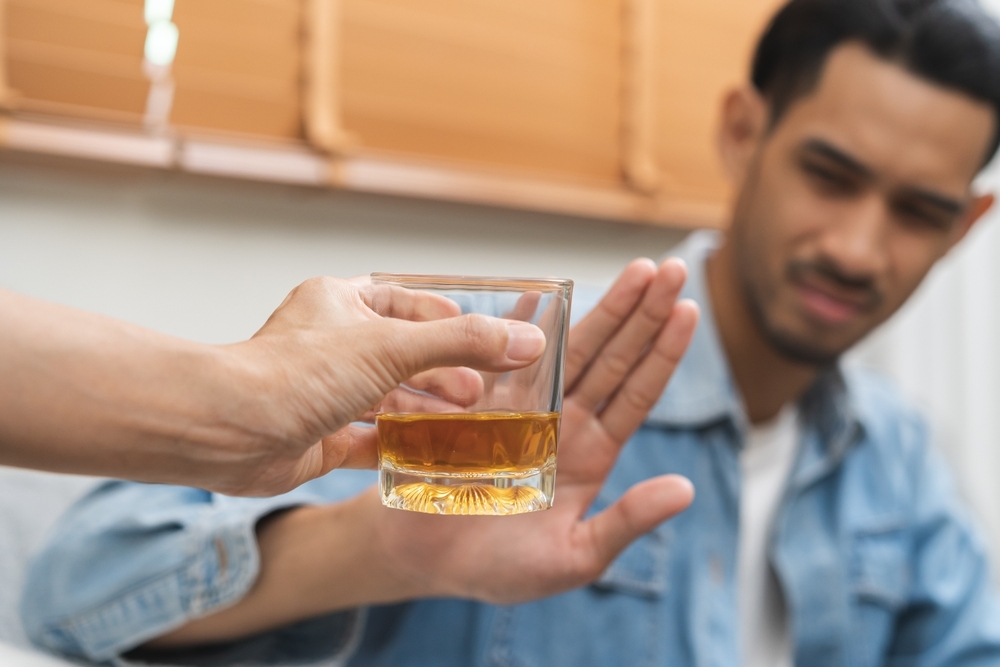Last Updated:
June 24th, 2025
One of the most tragic aspects of addiction is how it can give someone a false sense of comfort. A person might take a substance for temporary escape, while loved ones try to reach out and let them know the truth: that they are causing themselves harm in the long run.
Denial, then, functions as a dark hiding place, where an addicted person can defend themselves from genuine gestures of love and care from others.
We hope to show you how stripping away denial is often the first step in accepting the help you deserve and starting to heal, to break free from an addiction’s barbarous grasp.
What is denial, and how does it relate to addiction?
Denial is defined by the American Psychological Association (APA) as “a defence mechanism in which unpleasant thoughts, feelings, wishes or events are ignored or excluded from conscious awareness.” You may have witnessed denial in a loved one who can’t admit a problem, in a child who seeks to escape punishment, or in your own thoughts that are too hard to deal with.
Denial relates greatly to addiction formation and substance use disorders, though in the earliest stages of addiction, it may be more likely that a person lacks the awareness that an addiction is forming. In later stages of addiction, denial can be a detrimental force that keeps a person unmotivated, unwilling to change or simply blind to the truth that their health is worsening.
With this in mind, we may begin to fathom the immeasurable number of people who denied themselves the help they needed to escape an addiction, but that doesn’t need to be you.
The concept of denial in stages
When a person is in denial, then broadly speaking, they will either be suffering right now or they are on a path to suffer later. In the pursuit of bettering their clients’ chances of overcoming denial, behavioural psychologists place denial into frameworks such as the Kubler-Ross 5 Stages of Grief model.
The 5 Stages of Grief are denial, anger, bargaining, depression and acceptance. Many psychologists will see denial not only as the first stage, but also as the greatest hurdle to overcome and kick-start the process of healing grief. As we take a deeper and closer look at the first stage, we may conceptualise denial into stages: which are:
What are the signs in myself or others that indicate denial?
Denial functions as a comforting defence, or a shield that wards off the potential for healthy changes. Even when someone is coming from a place of genuine love, a person in denial may be so deeply addicted that they push back against the offer of help.
If you are using this shield, it will help you take a step back and reflect on their perspective. A long time may have elapsed, in which rationalising or normalising a problem has become second nature.
If you’re wondering whether you’re in addiction denial, consider some of these questions in an honest reflection:
- Do I ever feel the urge to blame others for my situation? Denial is a process laden with guilt and anger, which can cause accusations and blame-shifting. Some people genuinely recognise that they are their own cause of the addiction’s formation, but many people in denial will think along the lines of “If only my parents/friends/lover didn’t ___” or “if my job didn’t stress me so much I could ___” The fuel that starts the process of healing often stems from letting go of blaming others.
- Do I compare my drug use to other people’s? Before you let go of denial and start the recovery process, a person can easily compare their situation to another person’s and convince themselves that “I’ll be fine, because I don’t take as much as ___ does.” This can become a risky trap that downplays the danger you are in.
- Are there things I want to achieve that drugs hold me back from? It may not be the case for every single person, but most people with an addiction deeply feel that substances can hold them back from achieving aspirations. Think about the things you wanted to achieve during late adolescence, or around the time that the addiction may have started forming.
How can I start helping a loved one who is in denial?
It is never easy to get through to someone who is hostile toward genuine gestures of care. There are, however, some careful steps you can take that may improve your chances of starting their recovery, which are:
- Use a journal for your feelings: First and foremost, before you talk to them, get into the habit of journaling. This can help you recognise the ways your loved one’s actions are affecting you. Write in detail about any times that their addiction has caused you pain, such as broken promises and cancelled plans.
- Use “I” statements that avoid blame: After journaling and reflecting, it’s important to raise your points, but to avoid the tone of blame that they may hear in your plea. Use “I statements” like “I feel as though” or “I’m starting to worry about you.” “I statements” are better than “you statements” for minimising blame.
- Research treatment options: Finally, it will benefit you and your loved one if you start to research professional treatment for rehab and recovery. Look for contact information for expert treatment providers.
I don’t want to be in denial any longer
Denial can make you feel like you’re trapped in a long, dark tunnel, with no hope in sight. At times like this, we want to let you know that you’re not alone and escape is possible.
At UKAT Liberty House, we provide specialist addiction treatment programmes designed to help you break through denial and regain control of your life.
If you or a loved one is struggling with addiction denial, don’t wait to get the necessary help. Liberty House today and take the first step toward a life free from addiction.
(Click here to see works cited)
- “Apa Dictionary of Psychology.” American Psychological Association, American Psychological Association, dictionary.apa.org/denial
- Tyrrell P, Harberger S, Schoo C, et al. Kubler-Ross Stages of Dying and Subsequent Models of Grief. [Updated 2023 Feb 26]. In: StatPearls [Internet]. Treasure Island (FL): StatPearls Publishing; 2025 Jan-. Available from: https://www.ncbi.nlm.nih.gov/books/NBK507885/






